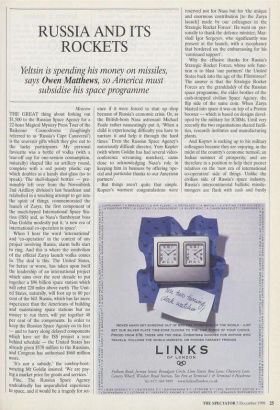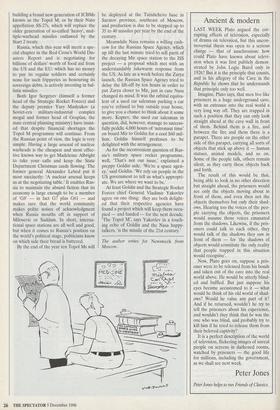RUSSIA AND ITS ROCKETS
Yeltsin is spending his money on missiles, says Owen Matthews, so America must
subsidise his space programme
Moscow THE GREAT thing about forking out $1,500 to the Russian Space Agency for a 22-hour Magical Mystery Press Tour of the Baikonur Cosmodrome (laughingly referred to as 'Russia's Cape Canaveral') is the souvenir gifts which they give out to the lucky participants. My personal favourite was a bottle of vodka (with a tear-off cap for one-session consumption, naturally) shaped like an artillery round, complete with a red pointy plastic cap which doubles as a handy shot-glass (so to speak). The shell-shaped bottles — pre- sumably left over from the Novosibirsk 2nd Artillery division's last beanfeast and relabelled in a touching attempt to get into the spirit of things, commemorated the launch of Zarya, the first component of the much-hyped International Space Sta- tion (ISS) and, as Nasa's flamboyant boss Dan Goldin modestly put it, 'a new era of international co-operation in space'.
When I hear the word 'international' and 'co-operation' in the context of any project involving Russia, alarm bells start to ring. And this is where the symbolism of the official Zarya launch vodka comes in. The deal is this. The United States, for better or worse, has taken upon itself the leadership of an international project which aims over the next decade to put together a $96 billion space station which will orbit 220 miles above earth. The Unit- ed States, naturally, will foot up to 80 per cent of the bill. Russia, which has far more experience than the Americans of building and maintaining space stations but no money to run them, will put together 40 per cent of the components. In order to keep the Russian Space Agency on its feet — and to hurry along delayed components which have set the ISS project a year behind schedule — the United States has already given $570 million to the Russians, and Congress has authorised $660 million more.
`It's not a subsidy,' the cowboy-boot- wearing Mr Goldin insisted. 'We are pay- ing a market price for goods and services.'
Fine. The Russian Space Agency undoubtedly has unparalleled experience in space, and it would be a tragedy for sci- ence if it were forced to shut up shop because of Russia's economic crisis. Or, as the British-born Nasa astronaut Michael Foale rather nauseatingly put it, 'When a child is experiencing difficulty you have to nurture it and help it through the hard times.' Even the Russian Space Agency's notoriously difficult director, Yury Koptev (with whom Goldin has had several video- conference screaming matches), came close to acknowledging Nasa's role in keeping him in business by offering 'spe- cial and particular thanks to our American partners'.
But things aren't quite that simple. Koptev's warmest congratulations were reserved not for Nasa but for 'the unique and enormous contribution [to the Zarya launch] made by our colleagues in the Strategic Rocket Forces'. He went on per- sonally to thank the defence minister, Mar- shall Igor Sergeyev, who significantly was present at the launch, with a sycophancy that bordered on the embarrassing for his `continued support'.
Why the effusive thanks for Russia's Strategic Rocket Forces, whose sole func- tion is to blast 'our partners' the United States back into the age of the Flintstones? The answer is that the Strategic Rocket Forces are the granddaddy of the Russian space programme, the elder brother of the cash-strapped civilian Space Agency, the flip side of the same coin. When Zarya blasted into space it was on top of a Proton booster — which is based on designs devel- oped by the military for ICBMs. Until very recently the two organisations shared facili- ties, research institutes and manufacturing plants.
And Koptev is sucking up to his military colleagues because they are enjoying, in the midst of the country's economic turmoil, an Indian summer of prosperity, and are therefore in a position to help their poorer relatives on the 'new era of international co-operation' side of things. Unlike the civilian side of Russia's space industry, Russia's intercontinental ballistic missile- mongers are flush with cash and busily building a brand new generation of ICBMs known as the Topol M, or by their Nato appellation SS-27s, which will replace the older generation of so-called 'heavy', mul- tiple-warhead missiles outlawed by the Start 2 treaty.
Russia, which this year will merit a spe- cial chapter in the Red Cross's World Dis- asters Report and is negotiating for billions of dollars' worth of food aid from the US and the EU: which has no money to pay its regular soldiers and certainly none for such fripperies as honouring its sovereign debts, is actively investing in bal- listic missiles.
Both Igor Sergeyev (himself a former head of the Strategic Rocket Forces) and the deputy premier Yury Maslyukov (a Soviet-era military-industrial complex mogul and former head of Gosplan, the state central planning ministry) have insist- ed that despite financial shortages the Topol M programme will continue. From the Russian point of view, the logic is very simple. Having a large arsenal of nuclear warheads is the cheapest and most effec- tive known way to get Madeleine Albright to take your calls and keep the State Department Christmas cards flowing. The former general Alexander Lebed put it most succinctly: 'A nuclear arsenal keeps us at the negotiating table.' It enables Rus- sia to maintain the absurd fiction that its economy is large enough to be a member of `G8' — in fact G7 plus G61 — and makes sure that the world community makes polite noises of acknowledgment when Russia mouths off in support of Milosevic or Saddam. In short, interna- tional space stations are all well and good, but when it comes to Russia's position on the world's political stage, politicians know on which side their bread is buttered.
By the end of the year ten Topol Ms will be deployed at the Tatishchevo base in Saratov province, southeast of Moscow, and production is due to be stepped up to 35 to 40 missiles per year by the end of the century.
Meanwhile Nasa remains a willing cash- cow for the Russian Space Agency, which up till the last minute tried to sell parts of the decaying Mir space station to the ISS project — a proposal which met with an understandably lukewarm response from the US. As late as a week before the Zarya launch, the Russian Space Agency tried to delay the lift-off by ten hours in order to put Zarya closer to Mir, just in case Nasa changed its mind. It was the orbital equiva- lent of a used car salesman parking a car you've refused to buy outside your house, to give you a chance to think about it some more. Koptev, the used car salesman in question, did, however, manage to success- fully peddle 4,000 hours of 'astronaut time' on board Mir to Goldin for a cool $60 mil- lion. Goldin himself professes to be delighted with the arrangement.
As for the inconvenient question of Rus- sia's military space rocket programme, well, 'That's not our issue,' explained a preppy Goldin aide. 'We're a space agen- cy,' said•Goldin. 'We rely on people in the US government to tell us what's appropri- ate. We are where we want to be.'
At least Goldin and the Strategic Rocket Forces chief General Vladimir Yakovlev agree on one thing: they are both delight- ed that their respective agencies have found a project which will keep them occu- pied — and funded — for the next decade. `The Topol M', says Yakovlev in a touch- ing echo of Goldin and the Nasa happy- talkers, 'is the missile of the 21st century.'
The author writes for Newsweek from Moscow.



















































































 Previous page
Previous page